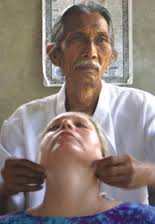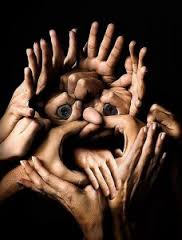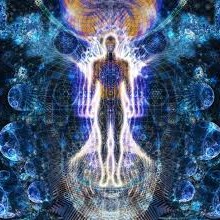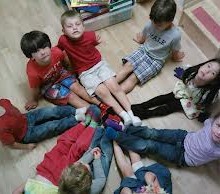Walking down the street, we expect the trees to stay in their places, and not transform themselves into buildings. All of these assumptions are taken for granted in our physical journeys. We may find different customs and languages, yet even these will be accepted in the vast, overall, basic assumptions within whose boundaries physical life occurs. We are most certainly traveling through the private and mass psyche when we so much as walk down the street. The physical world seems objective and outside of oneself, however. The idea of such outsideness is one of the assumptions upon which we build that existence. Interior traveling is no more subjective, than a journey from New York to San Francisco. We are used to projecting all destinations outside of oneself. The idea of varied inward destinations, involving motion through time and space, therefore appears strange.
Generally speaking, we have explored the physical planet enough so that we have a good idea of what to expect as we travel from country to country.
Before a trip, we can produce travel folders that outline the attractions and characteristics of a certain locale. We are not traveling blind folded,therefore, and while any given journey may be new to us, we are not really a pioneer: The land has been mapped and there are few basic surprises.
The inner lands have not been as well explored. To say the least, they lie in virgin territory as far as our conscious mind is concerned. Others have journeyed to some of these interior locales, but since they were indeed explorers they had to learn as they went along. Some, returning, provided guidebooks or travel folders, telling us what could be expected. We make our own reality. If we were from a foreign land and asked one person to give us a description for reality. The person might say “New York City is a frightful place in which crime is rampant, gangs roam the streets, murders and rapes are the norm, and people are not only impolite but ready to attack us at a moment’s notice. There are no trees. The air is polluted, and we can expect only violence. ” If we asked someone else, this individual might say instead: “New York City has the finest of museums, open-air concerts in some of the parks, fine sculpture, theater, and probably the greatest collection of books outside the Vatican. It has a good overall climate, a great mixture of cultures. In it, millions of people go their way daily in freedom. ” Both people would be speaking of their private beliefs, and would be colored by the individual focus from which each of them viewed that City.
One person might be able to give us the city’s precise location in terms of latitude and longitude. The other might have no such knowledge, and say instead: “I take a plane at such-an-such a place, at such-and-such a time, giving New York City as my destination, and if I take the proper plane I always arrive there.
Explorers traveling into inner reality, do not have the same kind of landmarks to begin with. Many have been so excited with their discoveries that they wrote guidebooks long before they even began to explore the inner landscape They did not understand that they found what they wanted to find, or that the seemingly objective phenomena originated in the reflections of the psyche.
We may, for example, have read books numbering the “inner realms,” and telling us what we can expect to encounter in each. Many of these speak of lords or gods of the realm, or of demons. In a strange way these books do provide a service, for at certain levels we will find our own ideas materialized: and if we believe in demons then in those terms we will encounter them. The authors, however, suppose that the devils have a reality outside of our belief in them, and such is not the case. The demons simply represent a state of our own mind that is seemingly out there, objectified. Therefore, whatever methods the authors used to triumph over these demons is often given as proof not only of the demons’ reality but of each method’s effectiveness.
Now if we read such books we may often program our activity along those lines, in the same way that a visitor to New York City might program experience of the city in terms of what he of she had been told existed there.
That kind of structuring also does a disservice, however, for it prevents us from coming in contact with our own original concepts. there is no reason, for example, to encounter any demons or devils in any trance or out-of-body condition. In such cases our own hallucinations blind us to the environment within which they are projected. All of its dimensions are faithfully and instantly produced as experience when we learn to take our “normally alert” conscious mind with us; and when we are free of such limiting ideas, then at those levels we can glimpse the inner powers of our own psyche, and watch the interplay of beliefs and symbols as they are manifested before our eyes. Until we learn to do this we will most certainly have difficulty, for we will not be able to tell the difference between our projections and what is happening in the inner environment.
Any exploration of inner reality must necessarily involve a journey through the psyche, and these effects can be thought of as atmospheric conditions, natural, at a certain stage, through which we pass as we continue.
Our world, is the result of a certain focus of consciousness, without which that world cannot be perceived. The range of consciousness involved is obviously physically oriented, yet within it there are great varieties of consciousness, each experiencing that seemingly objective world from a private perspective. The physical environment is real in different terms to an animal, a fish, a man, or a rock, for example, and different portions of those forms. This is highly important.
If an inhabitant from another reality outside of our own physical system entirely were to visit it, and if “his” or “her” intelligence was roughly of the same degree as our own, he or she would still have to learn to focus his or her consciousness into the same way that we do, more or less, in order to perceive our world. He or she would have to alter his or her native focus and turn it in a direction that was foreign to him or her. In this way he or she could “pick up our station.” There would be distortions, because even though he or she managed such manipulations he or she might not have the same kind of native physical structure as our own, or course, through which to receive and interpret those data his altered consciousness perceived.
Our visitor would then be forced to translate that information as best he or she could through his or her own native structure, if it were to make any sense to his or her consciousness in its usual orientation. All realities are the result of certain unique focuses taken by consciousness. In those terms, there is no outside. The effect of objectivity are caused as the psyche projects its experience into inner dimensions that it has itself created
Within, those frameworks are ever expanding, so that in our terms at least it seems that greater and greater distances are involved. Travel to any other land of physical reality must then involve alterations of consciousness.
While all of our thoughts and feelings are “somewhat” materialized, only some of them become physical in our terms. They are then accepted as physical reality. They provide the basis for the physical events, objects, and phenomena upon which we all agree. Therefore our world has a stability that works well enough for daily concerns. At that point we are tuned in precisely on our “home station.” We ignore the ghost symbols or voices, the probable actions that also occur, but that are muffled in the clear tones of our accepted reality. When we begin to travel away from that home station, we become more aware of the other frequencies that are buried within it. We move through other frequencies, but to do this we must alter our own consciousness. The probable realities connected with our own system are like the suburbs, say, surrounding a main city. If for simplicity’s sake we think of other realities as different cities, then after we leave our own we would pass through the suburbs, then into he country, then after a time into other suburbs until we reached another metro-city. Each metropolis would represent a conglomeration of consciousnesses operating within an overall general frequency of clearest focus, a high point of psychic communication and exquisite focus in the given kind of reality unless we are tunes in to those particular frequencies, however, we could not pick up that reality. We might instead perceive the equivalent of jumbled sound or meaningless static, or jigsaw images. We might simply realize that some kind of activity was there, nut without being able to pinpoint it.

























